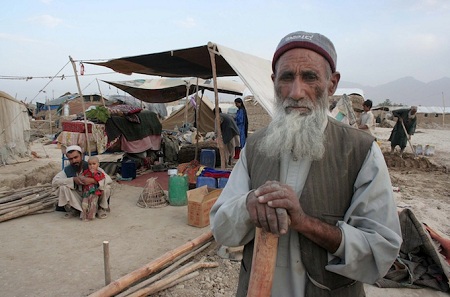By Gregg Carlstrom
More than 250,000 people have been displaced in the last two years of fighting in Afghanistan, and "local police" programmes sponsored by NATO have exacerbated the problem by arming militias, according to a new report from Refugees International.
Most of the internally displaced persons (IDPs) fled "international and Afghan military forces' operations against the Taliban," the report found. It also concluded that many IDPs are not receiving adequate assistance from the Afghan government or the United Nations.

Tens of thousands of people have fled following NATO airstrikes and house raids, the report found (Photo: EPA)
Displacement is nothing new in Afghanistan, where millions have fled their homes during decades of war and conflict. But the Refugees International report argues that the pattern of displacement has changed.
"Now, people are increasingly unwilling to return home because they fear their villages are no longer safe," the report states.
The report is especially critical of the Afghan Local Police (ALP) programme, which trains and equips local "defence forces" in Afghan villages. The programme has trained more than 6,500 fighters, according to the International Security Assistance Force, a joint US-NATO command in Afghanistan, and US commanders hope to reach 30,000 ALP members by year's end.
Hamid Karzai, the Afghan president, was reluctant to approve the programme - favoured by General David Petraeus, the outgoing commander of ISAF - because of fears that it would empower warlords. Lieutenant commander Colette Murphy, a spokeswoman for ISAF, insists that recruits are properly vetted.
"Shuras are held by [Afghan government] officials to enusre that the district is prepared for Afghan Local Police, that the shura is representative of the community, and that the selected ALP members are vetted and approved," Murphy said.
But NGOs in Afghanistan say that vetting often doesn't happen, or that it fails to keep bad actors out of the programme.
Gran Hewad, a researcher with the Kabul-based Afghanistan Analysts Network, wrote in March that former Hezb-i Islami fighters working for the ALP kidnapped villagers for ransom. And the New York Times reported earlier this month on an ex-Taliban member and current ALP recruit in Kunduz province who imposed an "Islamic tax" on villagers in his community.
"The militias are supposed to be vetted by the NDS, by local shuras, but that hasn't been happening," said Lynn Yoshikawa, an Afghanistan advocate at Refugees International.
"Either it's being ignored, or there's too much political pressure from local warlords and power brokers who want to be part of the programme."
House raids and air strikes
The report is also critical of home raids and air strikes, both of which have displaced tens of thousands of Afghan civilians. Some leave because their homes are destroyed, others because they no longer feel safe in their villages.
"In Faryab province [alone], heavy bombardments by ISAF and [Afghan forces] targeting the Taliban displaced nearly 10,000 people in January and more than 12,000 in May 2011," the report states.
Both have also caused deep resentment among Afghans. Karzai has demanded that NATO forces stop raiding homes and air attacks. But NATO has actually increased its air strikes since Karzai's ultimatum - it carries out around 12 per day - and home raids continue as well.
The IDP problem has grown particularly acute in northern Afghanistan: 30,000 people have already been displaced from their homes last year, a seven-fold increase from last year, according to Refugees International.
Security in northern Afghanistan has deteriorated since 33,000 American troops began "surging" into Afghanistan last year, most of them in the south. Insurgent attacks in Jowzjan, Badakhshan and Balkh provinces have more than doubled since last year, according to data from the Afghanistan NGO Safety Office.
"It makes sense when you think about how international forces have been squeezing in the south," Yoshikawa said. "They [the Taliban] are not putting up a fight there. Why bother? They're moving to other places."



